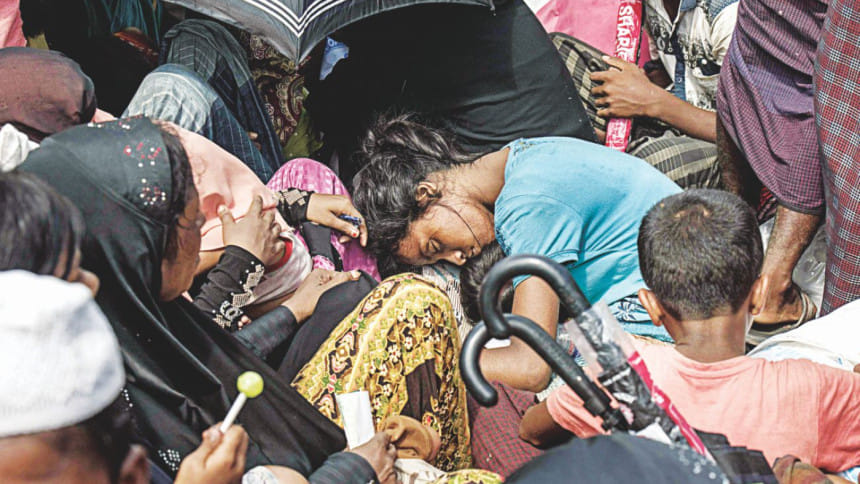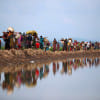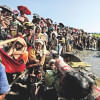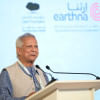Ensure voluntary return of Rohingya

The international community must help ensure that Rohingya refugees are not forced back to Myanmar as long as they remain at risk of serious human rights violations following the army's vicious campaign of ethnic cleansing, Amnesty International said yesterday.
The governments of Bangladesh and Myanmar on Monday announced plans to establish a joint working group for the repatriation of Myanmar nationals to their homeland in Myanmar.
More than 500,000 Rohingyas fled a military operation in Rakhine State since August 25. Foreign Minister AH Mahmood Ali yesterday said the presence of over 900,000 forcibly displaced Myanmar nationals is a serious humanitarian challenge for Bangladesh.
"While it is positive that Myanmar and Bangladesh are discussing options for the safe return of Rohingya to their homes, this must be a voluntary process and not lead to a hasty and reckless effort to push people back against their will. No one should be forced back to a situation where they will continue to face serious human rights violations and systemic discrimination and segregation," said Audrey Gaughran, Amnesty International's Director of Global Issues.
"The Myanmar military's horrific campaign against the Rohingya in Rakhine State amounts to crimes against humanity. The very first condition that must be met before any repatriation plan becomes reality is an unconditional end to the violence. But this is not enough -- the Myanmar government must also end the entrenched discrimination that has trapped Rohingya in a cycle of deprivation and abuse for decades."
Gaughran also called for international and UN oversight of the repatriation process and commended Bangladesh's "exceptional generosity" in opening its borders and hosting hundreds of thousands fleeing in desperation over the past month.
"The international community must step up to help Dhaka deal with the current crisis and its aftermath."
In another development, the UN committees for women's and children's rights yesterday called on Myanmar to immediately stop violence in Rakhine, saying human rights violations "being committed at the behest of the military and other security forces" might amount to crimes against humanity.
The Committee on the Elimination of Discrimination against Women and the Committee on the Rights of the Child urged the Myanmar government to promptly and effectively investigate and vigorously prosecute cases of violence against women and children.
"We are particularly worried about the fate of Rohingya women and children subject to serious violations of their human rights, including killings, rape and forced displacement," independent experts of the committees said in a joint statement issued in Geneva.
They urged the Myanmar civil and military authorities to fully comply with their obligations under both the Convention on the Rights of the Child and the Convention on the Elimination of All Forms of Discrimination against Women, and to exercise due diligence and prevent, investigate, punish and ensure redress for acts of private individuals or militias under its jurisdiction that violate women's and children's rights.
The experts also called on the Myanmar government to grant access to and fully cooperate with the fact-finding mission established by the UN Human Rights Council, so it can conduct thorough and independent investigations.
The government should also grant access to and fully cooperate with humanitarian aid agencies, the statement added.
AID GROUPS SEEK $434M
Humanitarian organisations helping Rohingya refugees in Bangladesh yesterday said they need $434 million over the next six months to help up to 1.2 million people, mostly children, in dire need of life-saving assistance, reports Reuters.
An estimated 809,000 Rohingyas have entered Bangladesh fleeing violence and persecution in Myanmar, more than half a million of whom have arrived since August 25.
"Unless we support the efforts of the Bangladesh government to provide immediate aid to the half million people who have arrived over the past month, many of the most vulnerable -- women, children and the elderly -- will die," said William Lacy Swing, director general of the International Organisation for Migration (IOM), which is coordinating the aid effort.
UN Resident Coordinator in Bangladesh Robert Watkins in a statement said the Rohingya population in Cox's Bazar was highly vulnerable, many having experienced severe trauma, and were living in extremely difficult conditions.
He said the the humanitarian agencies' plan for help over the next six months factors in the possibility of another 91,000 refugees arriving, as the influx continues.
"The plan targets 1.2 million people, including all Rohingya refugees, and 300,000 Bangladeshi host communities over the next six months," Watkins added.
DIPLOMATIC EFFORTS CONTINUE
Bangladesh has continued its diplomatic efforts to convince its friends to mount pressure on Myanmar to ensure return of the Rohingyas.
Foreign Secretary Md Shahidul Haque, now in New Delhi, will hold talks with his Indian counterpart Subrahmanyam Jaishankar at 6:00pm today.
Diplomatic sources said Indian External Affairs Minister Sushma Swaraj would be visiting Bangladesh on October 22-23 to attend the long overdue Joint Consultative Commission (JCC) meeting with his Bangladesh counterpart AH Mahmood Ali.
She will also hold talks with top government officials, including Prime Minister Sheikh Hasina. The minister might clarify India's latest stance on the Rohingya issue during her meetings with the government officials, the sources added.
Meanwhile, Deputy Prime Minister of Malaysia Ahmad Zahid Hamidi is expected to arrive in Dhaka on October 15 to see the condition of the Rohingya refugees in Bangladesh.
President and Prime Minister of Turkmenistan Gurbanguly Berdimuhamedow and Deputy Prime Minister of Uzbekistan Jamshid Kuchkarov also have expressed their interest in visiting Bangladesh.

 For all latest news, follow The Daily Star's Google News channel.
For all latest news, follow The Daily Star's Google News channel. 








Comments